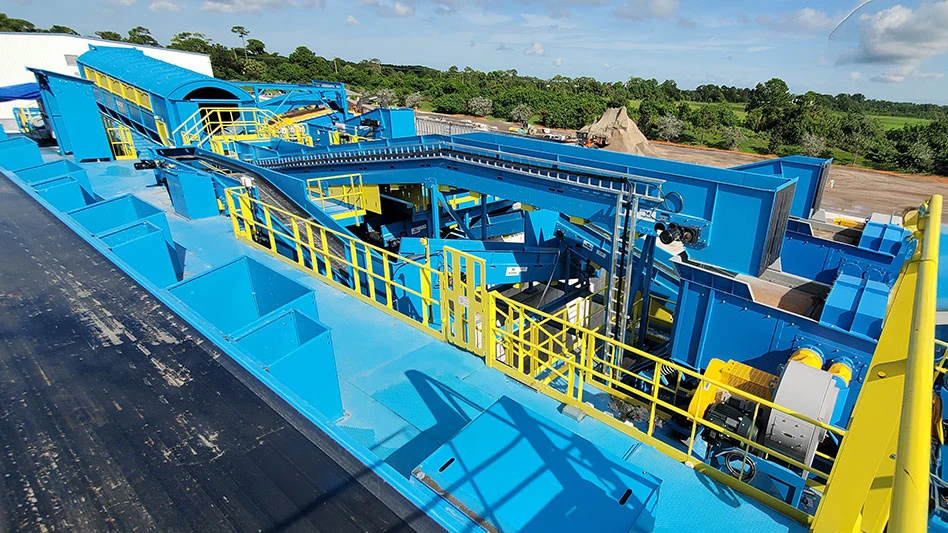EREMA hosts “Discovery Day” event in Austria
Erema Engineering hosted a Discovery Day event in late October 2014, inviting over 130 existing and potential international customers and guests to the company’s headquarters in Ansfelden, Austria, to highlight in-house recycling.
 The event included presentations from value-chain representatives including Borealis, SML, Polifilm Extrusion and Erema. There were also live demonstrations on several types of Intarema processing systems, particularly for flexible packaging materials. According to Erema, the demonstrations showed how processors can use in-house recycling solutions to return up to 100% of the plastic scrap to the production process and thus save production and labour costs. The live demonstrations took place in Erema’s Customer Centre.
The event included presentations from value-chain representatives including Borealis, SML, Polifilm Extrusion and Erema. There were also live demonstrations on several types of Intarema processing systems, particularly for flexible packaging materials. According to Erema, the demonstrations showed how processors can use in-house recycling solutions to return up to 100% of the plastic scrap to the production process and thus save production and labour costs. The live demonstrations took place in Erema’s Customer Centre.
The company says that in-house recycling solutions for flexible plastic packaging are a core competency at Erema, with half of the Erema systems sold around the world operating in this application field. The company says the newest generation Intarema plant offers users an additional boost in efficiency, thanks to its new, patented Counter Current technology, Smart Start system and enhanced EcoSave technology.
The Counter Current technology is designed to ensure recycling process stability despite varying characteristics and conditions of the input material, while the Smart Start system is intended to make operation extremely easy with a remarkably high degree of automation. The enhanced EcoSave technology reduces energy costs, according to Erema.
Both inline and offline systems were presented at Discovery Day 2014, and Erema says the recycling systems be integrated not only in the production lines but also installed externally.
For flexible and highly efficient offline applications Erema presented the new EFS Crocodile system with a technical conveyor belt for the dosing of endless edge trim. This innovation enables the constant feeding of tangled edge trim without pre-cutting for the first time, Erema says.
EnableLink says new shear has doubled production
U.K. scrap recycler had replaced two shears with a newer Danieli Henschel model.
U.K.-based EnableLink general manager Charlie Penn says the Danieli Henschel shear the company installed in 2013 has effectively changed the business.
The company added a CIP 1250-10 Danieli Henschel shear with six 90-kilowatt motors to replace two lower capacity models. Danieli Henschel is a subsidiary of the Italian recycling equipment company Danieli Centro Recycling.
“As well as saving on running costs, it gives us a product that is denser, cleaner and easier to melt,” Penn says. “The extra density means we can load an extra 10% into containers, which increases the margin for all concerned and has led to real interest from the international marketplace.”
Based in West Midlands, EnableLink has 20 employees and processes up to 600 tonnes per day of ferrous and nonferrous metals, with a core focus on heavy melt grades.
Giovanni Scarcelli, U.K. sales manager for Danieli Centro Recycling, says EnableLink and Danieli Henschel worked closely to select the proper equipment.
According to Danieli Centro Recycling, the new shear has helped EnableLink manage stockpiles more effectively and reduced operating costs.
Meanwhile Penn says the new machine is producing more than the two previous machines combined and requires one operator instead of two, and one feeding machine instead of two.
“We are now producing more scrap for less money, and a better grade of scrap into the bargain,” Penn says.
With the CIB 1250-10, steel is fed into an 8-metre box where it is hammered into a 900 x 800 centimetre log up to 8 metres long. The compacted material is struck with a clamp before the product is cut to length, Danieli Centro reports.
The company says with the new shear, production has doubled, to 600 tonnes per day.
Vulcanis adds overband magnet for can recovery
U.K.-based recycler Vulcanis has designed and built a new recycling plant to receive and recover steel and aluminium cans in its Barking, U.K., facility. The company purchased a twin pole cross belt magnet for steel can recovery from Bunting Magnetics Europe Ltd.
According to Bunting, U.K. consumers use approximately 13 billion steel cans and 50 billion aluminium cans per year, and recycling rates are 61% for steel (according to Tata 2014 figures) and 57% for aluminium (according to Alupro 2014 figures). For steel in particular, the U.K. government has set a target of 76% recovery by 2017.
The inspiration for the new plant came from Vulcanis Managing Director Mena Ramsis. “I could see that there was a need for additional recycling centres right across the U.K. and decided to build the Vulcanis plant in Barking,” Ramsis says.
The plant was designed and built after two years of global research and includes equipment sourced from three continents. A key part of the research focused on separation equipment including the magnetic separator for steel can recovery, leading Vulcanis to order the cross belt overband magnet from Bunting.
According to Bunting, Vulcanis executives found the Bunting design to be fundamentally different from those utilising a single pole. The Twin Pole Cross Belt Magnet projects two separate magnetic fields onto the surface of the conveyor belt and so doubled the chance of capturing the steel cans, Bunting says. The magnet was installed in August 2014.
The plant is designed to receive 2 tonnes per hour of mixed materials. Bunting reports that the plant is now at 40% capacity, operating eight hours per day, five days per week.
Ramsis hopes the company will be processing 12 tonnes per hour within five years.
WasteCare installs battery sorting system
WasteCare, co-owner of BatteryBack, which is one of the United Kingdom’s largest compliance schemes for household batteries, is partnering with Refind Technologies to install an automatic system for sorting discarded batteries. The system will allow WasteCare to sort more than 3,000 metric tons of batteries per year, of which 2,400 metric tons will be sorted automatically.
The installation will be made at a new facility in Halifax in West Yorkshire, England. Battery packs, cell phone batteries and button cells will be removed mechanically and sorted by hand while all cylindrical and 9-volt batteries will be fully sorted automatically.
The system from Refind has a capacity of 600 to 900 kilograms (1,300 to 2,000 pounds) per hour, according to Refind. Batteries are recognized by visual characteristics and are then separated by air ejectors with a speed of more than 10 batteries per second, the company says.
Refind Technologies, based in Gothenburg, Sweden, provides identification and sorting systems to the recycling and reverse logistics industry. Refind says its systems allow individual products such as batteries, cell phones or other electronics to be recognized and sorted in preparation for recycling, or if possible, reuse or repair.
The system at WasteCare will be its third system in the U.K., Refind says.
Stadler hosts open house at Eco Plastics
Stadler Engineering, headquartered in Germany and with offices in the U.K., hosted an open house at one of Europe’s largest bottle sorting facilities, Eco Plastics in Lincolnshire, U.K.
Stadler reports that it designed the Eco Plastics recycling facility and planned the open house event.
 The plastic recycling facility (PRF) opened in 2010, expanded in 2011 and now has an annual sorting capacity of 150,000 tonnes. According to Stadler, the comprehensive recycling process results in 11 different streams of plastic recyclate and leads to almost zero waste to landfill.
The plastic recycling facility (PRF) opened in 2010, expanded in 2011 and now has an annual sorting capacity of 150,000 tonnes. According to Stadler, the comprehensive recycling process results in 11 different streams of plastic recyclate and leads to almost zero waste to landfill.
The facility has recently undergone a further upgrade to increase the amount of material which can be recovered. By using its recycling and design expertise to incorporate an additional near infra-red (NIR) sorter, Stadler’s revised design allows for an additional 3% to 4% more plastic to be recovered, the company says.
A special host at the event was Willi Stadler, owner of Stadler Engineering, who travelled from Germany to tour the plant with the guests.
“We were delighted that Eco Plastics agreed to let us host an event at their industry-leading Lincolnshire facility,” says Trevor Smart, Stadler sales engineer. “The sorting equipment in this flagship plant highlights the capability of the advancing technology used within plastics recycling and, as the designers of the well-known PRF, we were thrilled to be able to give a guided tour of the facility not only to our customers, but also to the owner of Stadler Engineering, Willi Stadler.”
Latest from Recycling Today
- Greenwave raises revenue but loses money in Q2 2025
- Recycled steel prices hold steady
- EY says India’s need for scrap imports will continue
- Coming full circle
- Amcor, DCM introduce fertilizer packaging with 35 percent recycled content
- Comstock Metals gets closer to commissioning commercial-scale solar panel recycling facility
- Washington selects Circular Action Alliance as PRO
- Smurfit Westrock expands in Latin America





